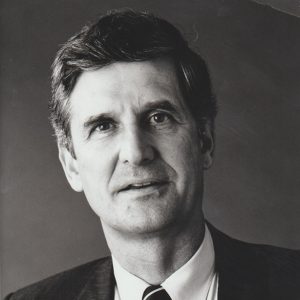calsfoundation@cals.org
Thomas Chipman McRae IV (1938–2004)
Thomas C. McRae IV was the great-grandson of U.S. congressman and twenty-sixth Arkansas governor Thomas Chipman McRae. He descends from a family that has lived in Arkansas since about 1839. McRae became well known for his involvement in philanthropic ventures, business development, environmental issues, and politics.
Thomas Chipman McRae IV was born in El Dorado (Union County) on June 11, 1938, to Carleton McRae, who was a chemical analyst, and homemaker Mary Joe Rogers McRae. He had a younger brother and sister. McRae was educated in the El Dorado school system and graduated from El Dorado High School in 1956. He then attended the University Arkansas (UA) in Fayetteville (Washington County), where he earned a BA in history in 1960, followed by an LLB degree from the University of Arkansas School of Law in 1963.
After graduating from law school, McRae joined the El Dorado law firm of Brown, Compton and Prewitt. After a short time, he left the firm to join the Peace Corps. From 1964 through 1966, he taught English and managed a boarding school for boys in Nepal. He also served as an advisor to the Nepali Land Reform Court, where he traveled from village to village by elephant. His Peace Corps service also allowed him to travel in Asia and Africa. While visiting Cairo, Egypt, he met his future wife, Christine Gilchrist. The couple were married in 1966 and eventually raised a daughter and son.
Completing his Peace Corps commitment, McRae and his new wife moved to Washington DC, where he became the program investigator/evaluator for the Office of Economic Opportunity. In this position, he worked to address the problem of poverty in the United States, cooperating with such agencies as Job Corps, Head Start, and VISTA. In 1968, McRae returned to Arkansas to become the director of Model Cities in Texarkana (Miller County), where he directed the development of projects to improve health, housing, social services, education, and other areas to help alleviate the suffering of the poor.
McRae’s first venture into the political arena was in 1971, when he accepted the position of chief of staff for newly elected governor Dale Bumpers. For approximately four years, he managed a staff of over thirty and was deeply involved in tax reform and the development of programs and policies designed to reorganize state government in order to make it more efficient. He also served as the director of the Ozarks Regional Commission, where he assisted in coordinating federal, state, and local efforts to develop the economy.
When Bumpers was elected U.S. senator in 1974, McRae became the first president of the Winthrop Rockefeller Foundation. The foundation is the largest of its kind in the state. McRae was deeply involved in economic development and improvements in education and developed a national reputation for innovation. Under his leadership, the foundation tripled its endowment. McRae later became a founding member of one of the state’s other major charitable organizations, the Arkansas Community Foundation.
In 1978, McRae was elected as a delegate to the 1979–1980 constitutional convention, where he became a prominent spokesman for the constitution, serving as chairman.
In 1990, McRae entered his first of two races for statewide office. He challenged Governor Bill Clinton in the gubernatorial Democratic Party primary, in which he finished second in a field of six, narrowly missing out on a runoff with Clinton. The race is best remembered for actions taken by the governor’s wife, Hillary Rodham Clinton. Upset with McRae’s campaign, she loudly interrupted a news conference being held by McRae at the Arkansas State Capitol. Contradicting McRae’s recent criticism of the governor, she read a list of compliments that McRae had made about the governor in past years.
When Clinton was elected president in 1992, Lieutenant Governor Jim Guy Tucker was elevated to governor, leaving the lieutenant governor’s office vacant. Once again, McRae finished second in a field of six in the special Democratic primary held in 1993; he lost to frontrunner Nate Coulter in a run-off election (Coulter then lost to Republican Mike Huckabee).
Following the election, McRae accepted the position of executive vice president of the Southern Development Bancorporation in Arkadelphia (Clark County) and was instrumental in its success and growth. He also served as the CEO of the Mountain Association for Community Economic Development in Berea, Kentucky.
McRae had a passion for the environment and was involved in a number of projects to preserve the natural habitat of Arkansas, including the designation of some of the first wilderness areas in the state. He was part of the struggle to preserve the Buffalo River in northwestern Arkansas and was instrumental in seeing that the river received national river status. He was also a strong advocate for alternatives to channelizing the Cache River in northeastern Arkansas, preserving it in its natural state. McRae also helped establish a model nature conservancy program in the state, which resulted in an inventory of Arkansas’s natural heritage.
McRae suffered a long while with ALS, eventually entering a hospice in Arkadelphia. He died there on January 29, 2004.
For additional information:
Rosenthal, Clifford N. Democratizing Finance: Origins of the Community Development Financial Institutions Movement. Victoria, BC: Friesen Press, 2018.
Thomas Chipman McRae IV Papers. Special Collections. University of Arkansas Libraries, Fayetteville, Arkansas. Finding aid online at https://libraries.uark.edu/specialcollections/findingaids/ead/transform.php?xml=mc1325 (accessed June 15, 2021).
Tom McRae political file. Museum of American History, Cabot, Arkansas.
Mike Polston
CALS Encyclopedia of Arkansas










Comments
No comments on this entry yet.